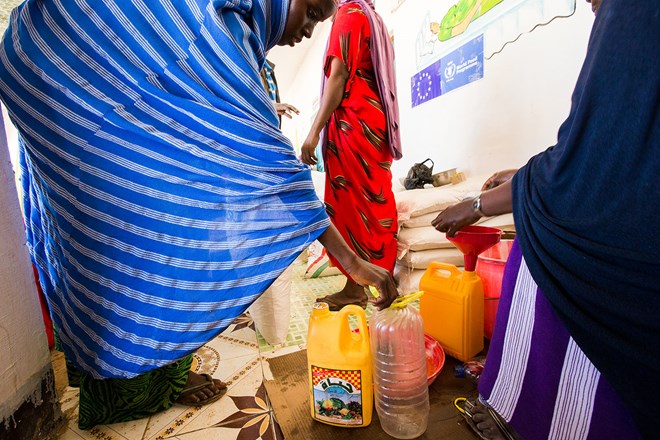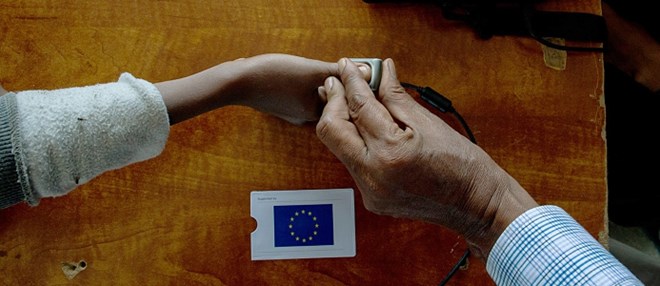
Wednesday February 15, 2017
Mireille Ferrari
At nutrition centres providing WFP support for mothers and young children, pregnant and nursing mothers receive monthly rations of a fortified nutrient-dense flour blend and vegetable oil. Photo: WFP/Kabir Dhanji
Khadija Maalliim Ali is 25, divorced, jobless and singlehandedly raising six children. She lives with her sister, also a single mother with 4 children.
With little means to buy nutritious or diversified foods, Khadija relies on support from a mother and child nutrition centre in Yaaqshiid, northeast of Somalia’s capital, Mogadishu. In addition to pre- and post-natal care and advice, she receives a monthly food ration from WFP as well as specialized nutrient-dense food supplements given to young children and a cash-based e-voucher to buy fresh food and vegetables. Together, these have helped Khadija and her small children avert malnutrition.
Through its Humanitarian Aid Operations, the European Commission is helping WFP reach vulnerable groups such as mothers and young children and internally displaced persons (IDPs). Wherever possible, WFP is using SCOPE, a digital platform that allows WFP to register beneficiaries using biometrics (fingerprint and photo), store information on the amount of food they are entitled to and – in the case of cash or vouchers – transfer the specific amount onto the cards.
Diversity and Choice
Xaliimo Mohamed Nuur is a divorced mother of six children aged between 2 to 10 years, living in an IDP camp in Bossaso. Life is difficult – none of her children attend school and she is unable to find work, but she says the security situation in Bossaso is far better than in Mogadishu, where she used to live. In the Bossaso camp, she has access to a health facility.
“I had nothing before except little support from my ex-husband. This food assistance has had a positive impact on my family – my children aren’t continuously hungry,” said Xaliimo who has been receiving food assistance from WFP for the last three months on her e-transfer card and finds it easy to use.
 \
\In a country with little to no formal means of identification, biometric data is used as a signature, ensuring that only people registered on the SCOPE card can receive and redeem entitlements. Photo by WFP/Kabir Dhanji
“I know how to place my finger in the fingerprint scan when they verify my card in the machine. I like that I buy food of my choice.”
Learning new skills
EU funding is also enabling Somalis to acquire new skills to help get them back on their feet. Hinda Osman Hassan is a 32-year old widow and mother of six. Her inconsistent domestic jobs, such as washing clothes, have meant that only her two eldest can go to school, while her four younger children stay home. Hinda recently completed a 9-month training course in Bossaso that consisted of 3-months of numeracy and literacy, followed by 6-months of mobile phone repair training. Throughout the duration of both training modules, she received monthly food entitlements on her SCOPE e-transfer card to feed herself and her family.
After the graduation ceremony, Hinda will receive a mobile phone repair business start-up kit. Her goals are clear.
“With my skills, I will be a big person with my own business, and food will not be a problem for me anymore. I will be able to send my children to school,” she explained.
Through its humanitarian support to WFP, the European Commission is making an impact each day. Humanitarian aid enables a Somali family to sit down to a meal it could not otherwise afford; it allows a single mother of six to provide food for her children while learning skills so she can go from washing clothes to repairing mobile phones; and it gives a mother and her children a better chance at a productive life through receiving food supplements to prevent malnutrition.
*With contributions by Habiba Bishar (Mogadishu, Somalia), Odette Kishabaga and Abdifatah Barre (Bossaso, Somalia).